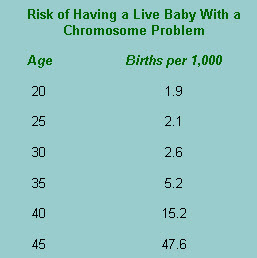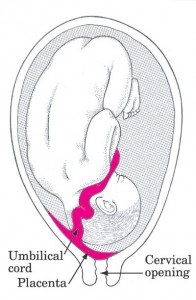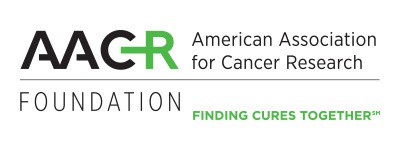Celebrity Baby “Boomlet” among Middle Aged Moms

Lately, there seems to be a baby “boomlet” among celebrities in their 40’s. Kelly Preston (wife of John Travolta) confirmed that she is 3 months pregnant at 47 years of age. Celine Deon, 42, has announced that she is pregnant with twins, after years of failed infertility treatments. And, the rumor mill is churning that singing diva, Mariah Carey, 40, may be pregnant with her first child with husband Nick Canon.
According to the American Society for Reproductive Medicine (ASRM), today 1 in 5 women in the United States has her first child after age 35. Most have healthy pregnancies and healthy babies, especially when they have good preconception and prenatal care. However, studies show that women in their mid-to-late 30’s and 40’s may face some special pregnancy risks.
What are the risks of pregnancy after 40?
- Fertility: All women begin to have a decrease in fertility, starting at age 30. It may be due to several things:
- Less frequent ovulation (release of an egg from the ovaries)
- Increased difficulty of an egg to become fertilized
- Medical conditions that are more frequent in older women such as blocked fallopian tubes and endometriosis
- Women who have had difficulty with fertility may be more likely to use assisted reproductive technologies (such as IVF)
- Genetic Disorders: The risk of genetic disorders and birth defects increases with age.

- Down’s Syndrome is the most common chromosomal birth defect.
- All pregnant women, but especially those over 35 years old should be offered genetic screening or testing:
- Screening can be done by blood work or special ultrasound (they are not as accurate as genetic testing in determining the risk of genetic defects).
- Testing is done either by:
- amniocentesis : a small amount of amniotic fluid is taken from the sac around the baby, and infant cells in the fluid are analyzed. This is typically done at 15-20 weeks of pregnancy
- chorionic villus sampling: a small sample of cells is taken from the placenta and tested. This can be done at 10-12 weeks of pregnancy.
- Health problems more common in older women:
- High blood pressure: can affect the placenta and the growth of the fetus.
- Diabetes, or gestational diabetes (diabetes which occurs only during pregnancy): It can cause the fetus to “overgrow”, called macrosomia. Diabetes can also lead to increase miscarriage and maternal blood pressure elevation.

- Placental problems: The most common placental problem is placenta previa (See diagram on left), in which the placenta covers part or all of the opening of the womb (cervix). Bleeding from a placenta previa can be severe, endangering the lives of both mother and infant. Women over 40 are 3 times more likely than younger women to have this complication.
- Prematurity of newborn:Women ages 40 and older are more likely than women in their 20s and 30s to deliver prematurely (before 37 completed weeks of pregnancy). Premature infants are more likely to be low birth weight, have increased health problems, some of which can have long term effects.
- Increased risk of C-section: Mothers over age 40 appear to be more than twice as likely as mothers under age 20 to have a c-section.
- Increased risk of twins: This is thought to be due to a release of more eggs during ovulation as a women ages (perhaps in an effort to increase the number of children born before menopause). Use of in vitro fertilization (IVF)to become pregnant often leads to multiples as several embryos are implanted at once in the hope that one will survive.
Although pregnancy over 40 has increased risks associated with it, with early and regular prenatal care, most pregnancies will have happy, healthy outcomes.
For more information:
| Resounding Health(tm) Pregnancy after 40 |
























0 comments